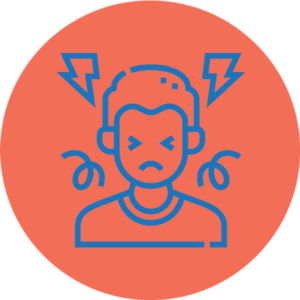Stress is the body’s response to the challenges around us. While some stress can be beneficial, long-term stress can cause many problems and have significant short- and long-term consequences on physical and emotional health. For adolescents, the physical response to stress kicks in a lot more quickly as the part of their brain that can calmly assess danger and puts a halt to the stress response (the prefrontal cortex) is not yet fully developed. While nobody can avoid all stress, we can teach our children ways to deal with it and find positive coping strategies.
 Signs of stress in youth can show up in several ways. If your child begins to exhibit these signs, the stress may be too much for them to handle on their own and may need help:
Signs of stress in youth can show up in several ways. If your child begins to exhibit these signs, the stress may be too much for them to handle on their own and may need help:
Irritability and Anger: Stressed out kids might be more argumentative or short tempered than normal.
Changes in Behavior, Cooperative kids become very argumentative. Social kids suddenly do not want to venture out of the house.
Trouble Sleeping: A child or teen might have difficulty sleeping, sleep more than usual or complain of feeling tired all the time.
Eating Changes Eating too much or too little.
Getting Sick more often. Stress often shows up as physical symptoms. Kids who feel stressed often report headaches, stomach aches, and make frequent trips to the nurse’s office.
Experimentation with drugs. A negative coping mechanism that can lead to greater physical and mental health issues.
The good news is that there are a variety of ways parents and guardians can assist their children in learning to both manage and cope with stress. A good beginning is by being aware of their behaviors and emotions and by building trust, so they are comfortable confiding their feelings. Encourage your child to try the following strategies. Tips to help kids cope with stress Include:
- Get some sleep.
Sleep is essential for both physical and mental health. Getting enough will aid the body in growing and developing normally, as well as allowing for an easier time paying attention. While teenagers require about 8-10 hours, younger children need more like 9-12.
- Find time for fun & quiet.
Find activities or hobbies that bring joy, and help your teens find ways to incorporate them into their life. While some kids thrive on moving from one activity to the next, others need more down time. Finding a healthy balance between the two is ideal.
- Focus on Strengths.
Every person has their own magic, meaning their own unique strengths, talents, and characteristics. By focusing on and recognizing strengths, they can keep their stressors in perspective. Research has also found that writing about what you are proud of or grateful for can ease symptoms of anxiety and depression.
- Engage in Physical Activity
Exercise not only takes our minds off stress, but also causes chemicals (endorphins) to be released into the brain that makes us feel better. Exercise can be as simple as a brisk walk outside, shooting a couple hoops with friends or an impromptu dance party. Being outside in nature has its own effective way in relieving stress, so combining the two may lead to added benefits.
- Talk to Someone
Managing stress can be difficult. Having a trusted adult to talk to, such as a parent, teacher or therapist can help kids put things into perspective and find solutions. Work with your children to develop a list of adults they can turn too for guidance when needed.
Feeling stressed is a natural part of life for all people, no matter what age. While we cannot protect our children from it, parents and guardians are able to model healthy coping strategies and support them in managing difficult times when it is too much for them to on their own. It also doesn’t hurt to remind them again and again how much they are loved and that they have the support of their family and friends to help them through tough times.
 Written by Susan Foley – Health Educator
Written by Susan Foley – Health Educator
Resources
- American Psychological Association, “How to Help Children and Teens Manage Their Stress” October 19, 2022
- org, “5 Tips to Help Teens Cope with Stress”
- Paccione-Dyszlewski, Margaret R. PhD, “Teens, Stress and How Parents Can Help”. September11, 2020
- Willsey, Pamela S. LICSW, BCD, PCC, “ 7 Ways to Help Teens Manage Stress”, 1/16/20
